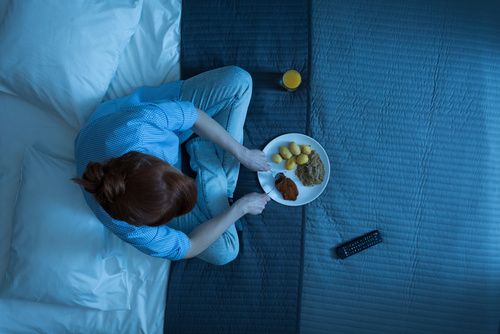Late Dinners Boost Blood Sugar, But "Divided Dinners" Don't
So-called “divided dinners” are a practical strategy for people with T2D.

Eating dinner late at night increases hyperglycemia in patients with type 2 diabetes — but not if that dinner is split into 3 servings eaten 5 minutes apart, according to a team of Japanese researchers.
Led by Saeko Imai of the Department of Food and Nutrition, Kyoto Women’s University, Kyoto, Japan, hypothesized that eating late-night dinners would increase postprandial (after-meal) glucose levels in patients with type 2 diabetes.
To test their hypothesis, they conducted a randomized, controlled study of 16 individuals recruited from Kajiyama Clinic outpatient facility. All patients wore glucose monitors for 5 days and ate identical test meals for 3 days — between the second and fourth days of the study.
“The test meals, which consisted of boiled white rice, white bread, milk, vegetable, and frozen lunch boxes of gluten-meat steak and fried fish with vegetable had the same macronutrient content and composition within-patient in 3 study days,” the researchers wrote.
Meals were adjusted for individual patient needs. One night the patients ate dinner at 6AM, another at 9PM, and the third in blocks of 5 minutes for the 3 parts of the meal, with 5 minutes for the vegetables, 5 minutes for the main dish, and 5 minutes for the rice/bread portion of the meal.
The researchers found that patients’ consumption of late-night-dinner was associated with postprandial hyperglycemia, but the divided dinner reduced postprandial hyperglycemia. They further noted that the difference between glucose levels on the two nights was significant.
“The reduction of postprandial hyperglycemia by consuming the divided dinner can be a practical strategy for patients with type 2 diabetes who consume dinner late at night,” researchers wrote.
Study authors theorize that the circadian clock could influence glucose metabolism and result in higher glucose levels after a late-night-dinner. With a longer fasting time between lunch and dinner, it’s possible that the circadian clock is misaligned and causes higher postprandial hyperglycemia throughout the night. Also, divided dinners could be especially useful for those who work shifts and/or at night because they are at higher risk for obesity and metabolic syndrome.
Of the 16 participants, 6 used diet-only to control their diabetes, 10 were taking an oral hypoglycemic agent, 4 were taking antihypertensive medications, and 8 were taking lipid-lowering drugs. There was no significant difference between results in patients taking oral hypoglycemic agents and those who were not.
Researchers acknowledge limitations to the study, for example, only Japanese men and women participated.
“We assume both dividing the dinner and the nutritional composition of the dinner might affect the postprandial glucose levels in the dividing dinner, although we did not perform ‘just dividing dinner with the same nutritional composition’ nor ‘reverse the nutritional composition of 1800 h [6PM] and 2100 h [9PM]’”. Although the authors do not mention it, the small sample size must also be considered a limiting factor.
The full study can be found in the journal Diabetes Research and Clinical Practice.
Related coverage:
Insulin as a Strategy to Optimize Glycemic Control in Patients with Type 2 Diabetes
Alternate Day Fasting Effectiveness Not Affected By Meal Timing
How Does Ramadan Fasting Affect Diabetic Muslims?